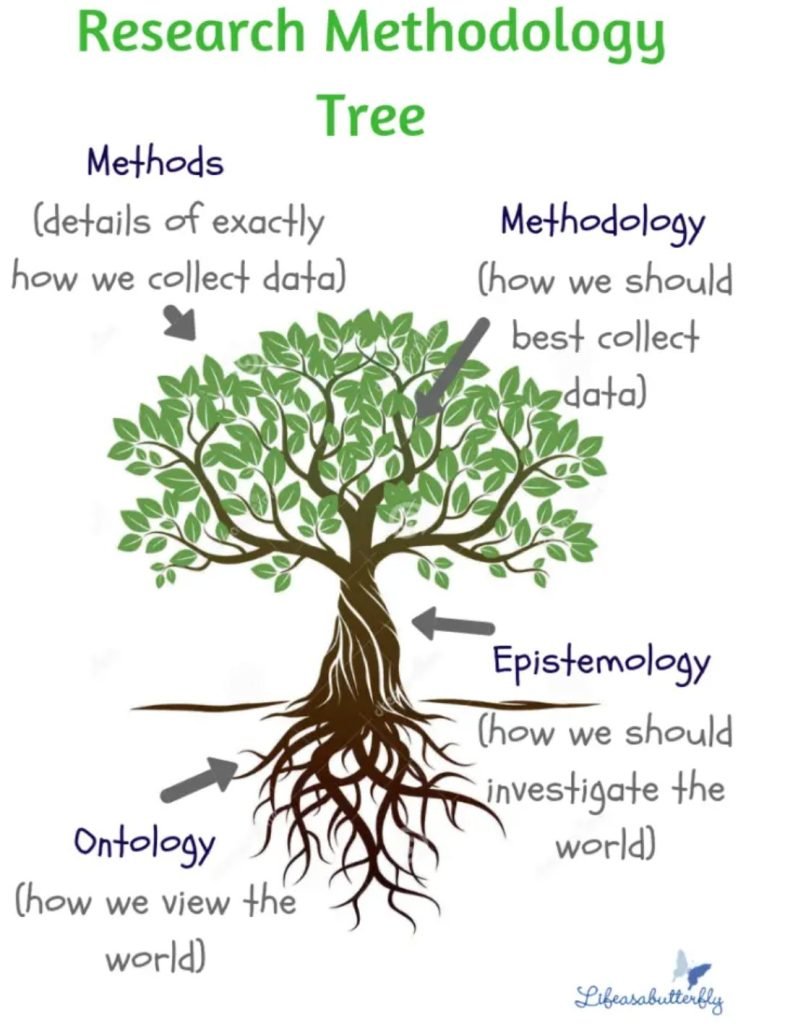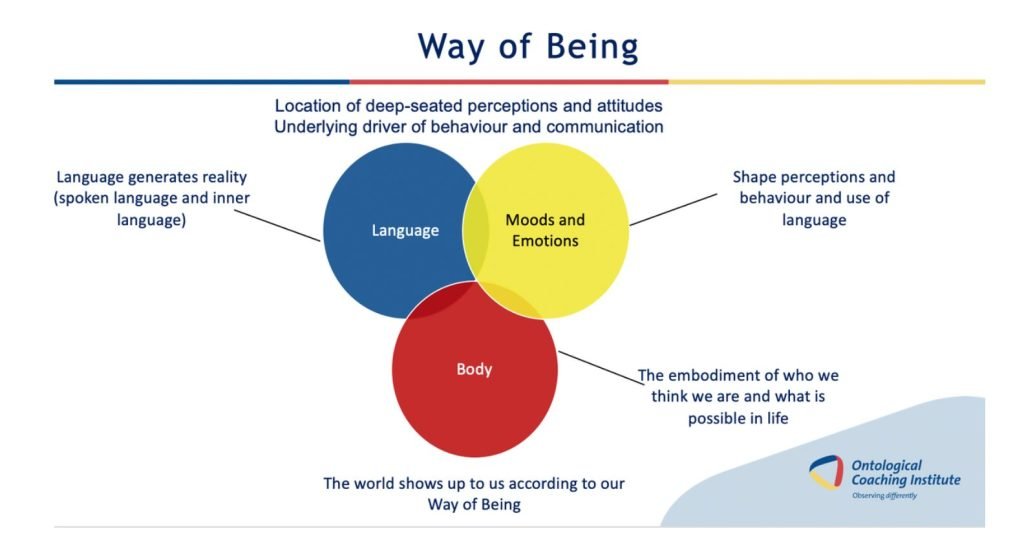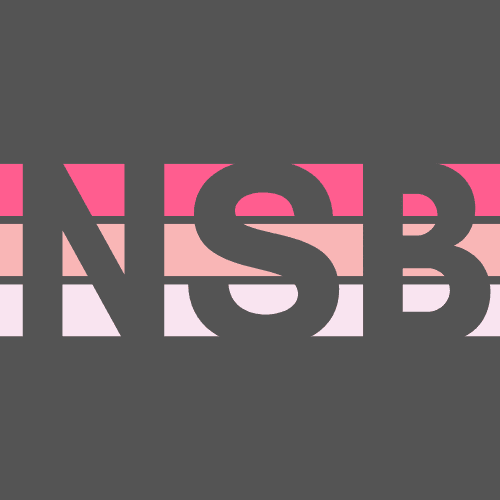Ontological Coaching comes from the teachings of Ontology.
Ontology comes from philosophical study of the nature of being, becoming, existence, or reality. This along with the basic types of being in addition to their relations.
Research philosophy is essentially a set of beliefs or metaphysics that represent the researcher’s world-view; the nature of ‘the world’ and the individual’s place in it.
There are two dominant positions within ontology; realism and nominalism.
- Realism: The researcher views the world as existing separately from humans and their interpretations of it.
- Nominalism: The researcher believes that their interpretations of the world are based on their inner subjectivity and the personal ‘lens’ through which they are viewing.
Whilst this may sound simple, it is not black and white – in fact there are many shades of grey!
Ontology, at its simplest, is the study of existence. But it is much more than that, too. Ontology is also the study of how we determine if things exist or not, as well as the classification of existence. It attempts to take things that are abstract and establish that they are, in fact, real.
I love this artistic representations by Dr Hayley Stainton


Examples of ontological questions:
- Does God exist?
- Are my feelings real?
- What is ‘nothing,’ and does it exist?
Ontological Coaching therefore, lives in the belief that you are a co-creator, and also the nature of your respective being is related to your reality.
What is Ontological Coaching?
An Ontological Coach brings awareness to new possibilities through questioning, and supports someone to take effective action.
A person’s ‘way of being’ refers to how that person perceives the world. It determines the actions he would consider taking, which ultimately determine the results he creates. The results we create therefore provide feedback on our way of being and how we observe the world.
For example, if a person were working in a safe but boring job – it may indicate that he or she perceived the world as a risky place and placed a premium on security. He or she would only be able to become a successful entrepreneur if he or she fundamentally shifted the way he or she saw the world – as a place full of opportunities rather than threats and fear. He or she would have to shift his or her ‘way of being’.
A person’s ‘way of being’ can be understood more clearly by breaking it up into three areas – the way he or she uses language, the mood he or she generates and the way he or she uses his or her body.

Language
If a boss asks a subordinate whether he will be able to complete a project on time there is a big difference between the answers ‘yes’ and ‘I’ll try’. By being conscious of the different uses and abuses of language we can become far more effective in creating what we want to achieve with others. The problem is that we are so used to the language we habitually use (including the internal conversations in our head) that we don’t realize what we are generating. Language has long been considered an inert tool that describes reality. But Newfield coaches understand that language is actually highly active and in fact generates reality, as we perceive it. Newfield coaches are highly sensitized to the various distinctions and can help their trainees learn to employ language far more effectively.
Moods and Emotions
Many times we have fights with a loved one and know on some level that we should apologize or make a peace offering. However, we are unable to take that action because we are stuck in the emotion of stubbornness. Our moods and emotions also determine our ‘way of being’ and the results we create. A coachee who is predominantly in the mood of ‘anger’ will produce very different results from one who is predominantly in the mood of ‘gratitude’. This is an area that most basic coaching models miss.
Newfield coaches understand the importance of practices that will help their coachees learn to stay more consistently in a mood that is effective for creating what they want.
Somatics
The way a person lives in his or her body also determines how he/ she perceives the world. The simple act of deliberately uncrossing ones arms facilitates a more open way of being. Standing up straight can increase a person’s confidence, but most of us are unconscious of the habitual patterns our body holds.
Newfield coaches become adept at coaching people on how to understand their body so as to create shifts in their way of being. In our coach training program we have a team of trainers, some of whom work exclusively on showing participants how to understand their body to generate the appropriate nonverbal presence for the situation they are dealing with.
Language, moods and body are all coherent. A shift in one can produce shifts in the other two and so this creates multiple entry points into shifting a person’s way of being which, as we’ve discussed, determines the results they create.

The Focus: Mind, Body, and Spirit
Ontological coaching recognizes that you are a whole person – not just your thoughts, but also your emotions, bodily sensations, and that intuitive inner voice. Here’s where science comes in:
- Decipher Your Language: The words we use shape our world. Studies on neurolinguistics show that language directly impacts perception and how we create our reality. [Source: National Institutes of Health (NIH)]
- Befriend Your Emotions: Emotions are clues, not roadblocks. Neuroscience emphasizes the link between emotions, decision-making, and behavior. Learning to identify and understand your emotions empowers better choices. [Source: Harvard University]
- Listen to Your Body: Physical sensations tell a story. Our bodies store emotions and memories. Research supports the importance of embodiment for both well-being and decision-making. [Source: ScienceDirect]
This integrated approach is powerful because real change occurs not just in our minds, but also within our hearts and bodies.
The part connected with an Ontological Coach is just not to give you the answers on account of your inner knowing is creative and resourceful. They facilitate your strategy to acquire a deeper learning with a subconscious and conscious level, which fits beyond one session.
This process might be more sustainable than only teaching the “how to’s” that just temporarily satisfy. They also show you to be aware about the three components of body, language, and emotions along with teaching proper planning and strategy because all things are interrelated and strongly related to the more human potential.
Transforming from the Inside Out
Ontological coaching creates a ripple effect. When you reshape your internal world, your external reality can’t help but shift in response. Benefits you might experience include:
- Unwavering Self-Awareness: Gain a crystal-clear understanding of your strengths, challenges, and what makes you tick.
- Breaking Free of Limitations: Dissolve those deeply ingrained patterns and self-talk that sabotage your success and happiness.
- Enhanced Relationships: Communicate authentically, connect deeply, and navigate conflicts with wisdom.
- Purposeful Action: Discover what truly lights your fire and chart a path aligned with your core values.
- Unleashed Creativity: Break out of mental boxes and let your solutions and ideas flow.
Is Ontological Coaching For You?
This approach is ideally suited for those ready to explore big questions and aren’t afraid of profound change. Consider these inquiries:
- Do I want more meaning and fulfillment beyond external achievements?
- Am I ready to challenge my ingrained ways of thinking and open myself to new possibilities?
- Do I long to connect with my authentic self and create life truly aligned with my values?



